L’Algérie agricole et rurale 60 ans après : de la décolonisation au modèle concessionnaire
Après un rappel de l’héritage colonial et une critique du mythe de la prospérité coloniale, l’étude évoque les principales transformations opérées au cours des premières décennies (1960-1970) sous l’effet des politiques de réformes agraires (autogestion et révolution agraire), ainsi que les raisons qui sont au fondement des options libérales qui ont été retenues lors des décennies qui ont suivies (1980-2000).




